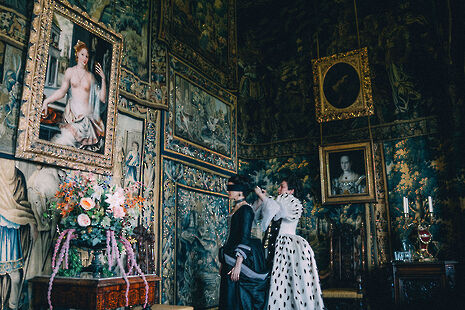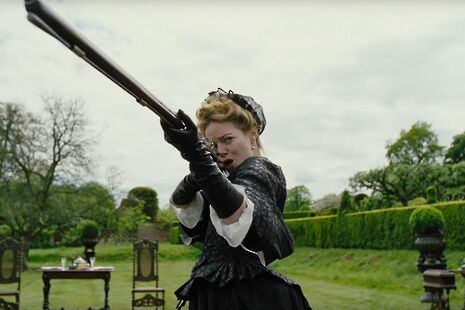Almost The Favourite
Film and TV Editor Madeleine Pulman-Jones is largely impressed by Yorgos Lanthimos’s saga of love and power in the court of Queen Anne

Directed by Yorgos Lanthimos
Starring Olivia Colman, Emma Stone, Rachel Weisz
Released 1 January
Controversial auteur Yorgos Lanthimos always wants to make an impression, and his latest, absurdist comedy drama might be his most impressive yet. The Favourite’s impressions range from the abstract to the viscerally physical. Its soundtrack pulsates with violently flamboyant string crescendos, and neither Emma Stone nor Rachel Weisz’s face makes it through the film without battle scars. Whether Lanthimos has made the impression he intended is doubtful. But even if the film fails to pack the desired punch, it doesn’t stop you leaving the cinema flushed and aching – perhaps not bruised, but feeling as though someone on the street had bumped into you hard, and run off without saying sorry.
A subversive queer period piece with echoes of Sally Potter’s Orlando and Rouben Mamoulian’s Queen Christina, The Favourite centres on the love triangle and power struggle between Queen Anne (Olivia Colman), her confidante and secret lover Sarah Churchill (Rachel Weisz), and Sarah’s ruthlessly ambitious cousin, Abigail Hill (Emma Stone). Set in 1708 when Britain was at war with the French, Sarah is apparently ruling the kingdom through Anne, making decisions for the sickly and weak-willed monarch, who would rather sit around eating cake and playing with her rabbits than concerning herself with affairs of state. This already tumultuous relationship is threatened when Sarah’s cousin Abigail, penniless and fallen from grace, arrives at court in search of employment. Having quickly worked her way up from scullery maid to Sarah’s lady-in-waiting, after discovering the Queen’s secret affair with Sarah, Abigail turns her attentions to wooing the queen away from her cousin, and winning back the coveted title of ‘Lady’.
Shot in Lanthimos’s trademark deadpan style, The Favourite is rightly gaining traction for its groundbreaking portrayal of female sexuality, both in an historical and contemporary context. Yet what is more striking than the film’s queer love scenes, which are indeed many and steamy, is its subtle yet total subversion of gender dominance in narrative. The Favourite does away almost entirely with male characters, pushing them to the side-lines, with doormen and subservient politicians frequently waiting in porticos or at the side of women, robbed of their social and cinematic agency. In Lanthimos’s early modern England, costumed by the wonderful Sandy Powell who also worked on Orlando, men wear wigs and makeup to “be pretty,” and women go bare-faced without a hint of self-consciousness. In one scene, Anne presents her makeup to Sarah before meeting the Russian ambassador – “Do you like it?” she asks, to which Sarah replies with equal measures of pity and irritation, “you look like a badger,” before adding affectionately, “I will manage this”.

Though the look of Lanthimos’s film has, as his films often do, a tendency to seem demonstratively auteur, his motion-sickness inducing use of cross-fades and sweeping wide-angle shots are entirely affecting, giving the viewer the feeling that they too are Rachel Weisz being flung around at a ball, or Colman and Stone rolling around on the floor in hysterics. Pacing, always a challenge for directors who are insistent on unnatural line delivery, is patchy in, with some scenes, particularly those of Stone and Colman, falling flat after several minutes. However, the relentless drive of both Lanthimos’s vision and a stunning supporting performance from Rachel Weisz ultimately prevent the film from running out of steam.
The Favourite is Weisz’s second Lanthimos feature, returning to the avant-garde roots she cultivated at Cambridge where she founded the experimental theatre company Talking Tongues. While Colman is unusually tender as Queen Anne, she lacks the complexity demanded of her by Tony McNamara and Deborah Davis’s intricate script, and Emma Stone, a welcome source of energy throughout, is unable to make a complete departure from her self-consciously comedic performance style.
Ultimately, neither Colman nor Stone, a misjudged casting choice despite a flawless English accent, manages to plausibly and affectingly exist in Lanthimos’s bizarre universe. That said, the romances, particularly that between Anne and Sarah, never lose credibility. But where Colman and Stone stumble at the last hurdle, Weisz jumps triumphantly up and over into a rarely explored mode of performance, combining tonal nuance with dry delivery, playing against her naturally soft demeanour just enough to frighten you when she suggests, “let’s shoot something”.
I was surprised to find that the audience found such dry humour far less funny than the sillier lewd jokes that pepper the film – apparently the fact that people in the past were just as bawdy as we think we are is still a novelty. The Favourite is disquietingly funny, unsettlingly out of control, and impressively nuanced. Even if Lanthimos’s ambition is what causes the film to finally fall short, better that he made the leap in the first place than add yet another cookie-cutter period film to the already bursting shelves of British period cinema. While perhaps not a firm ‘favourite’, Lanthimos’s drama is a deserving heir to films such as All About Eve and The Bitter Tears of Petra Von Kant, and hopefully constitutes a move toward films about flawed women as flawed people, and away from lazily drawn caricatures of womanhood
 News / Clare Hall spent over £500k opposing busway 24 December 2025
News / Clare Hall spent over £500k opposing busway 24 December 2025 Comment / The ‘class’ of Cambridge24 December 2025
Comment / The ‘class’ of Cambridge24 December 2025 News / Caius mourns its tree-mendous loss23 December 2025
News / Caius mourns its tree-mendous loss23 December 2025 News / Girton JCR publishes open letter expressing solidarity with Palestine25 December 2025
News / Girton JCR publishes open letter expressing solidarity with Palestine25 December 2025 Comment / Yes, I’m brown – but I have more important things to say22 December 2025
Comment / Yes, I’m brown – but I have more important things to say22 December 2025










